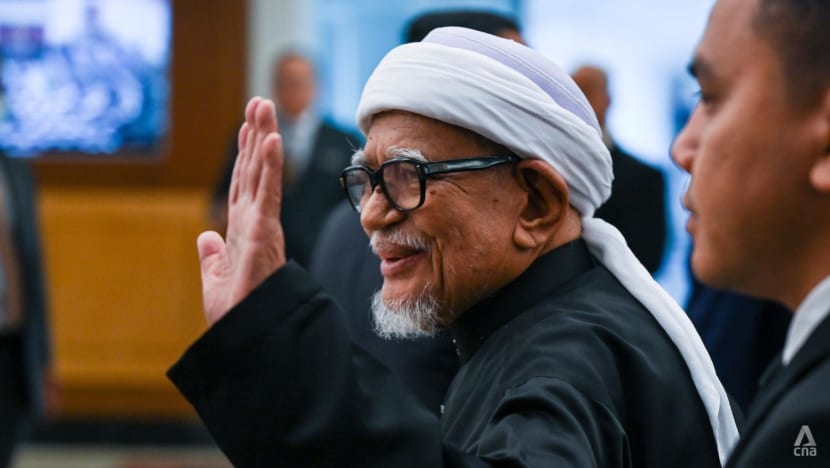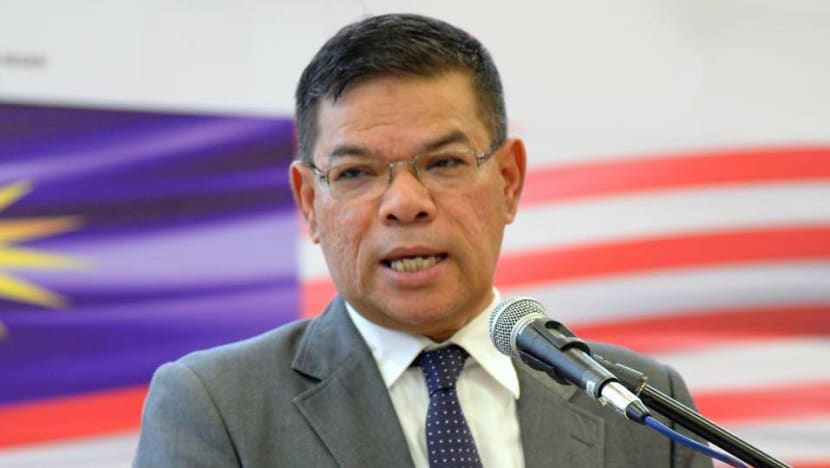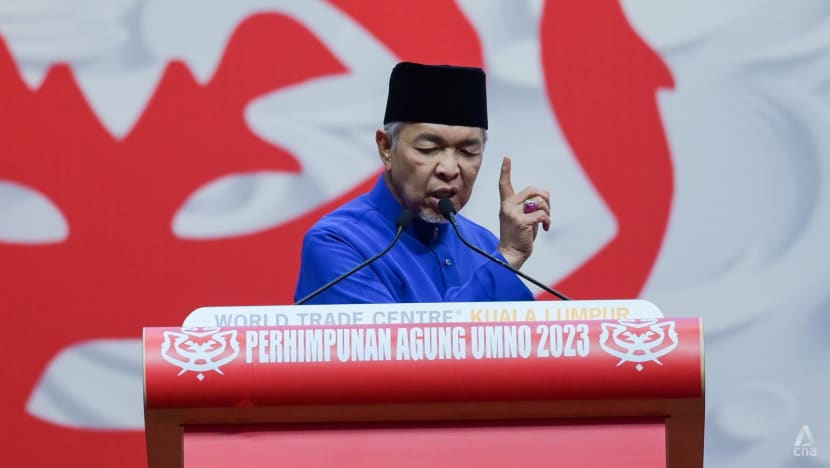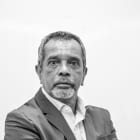analysis Asia
PAS and its chief Abdul Hadi seeking to exploit Malaysia's shifting political horizon

KUALA LUMPUR: A cleric has emerged as the most serious wildcard in Malaysia’s shifting political horizon.
After years as a fringe player in national politics, Mr Abdul Hadi Awang, 75, now occupies the political limelight together with his Islamist party Parti Islam Se-Malaysia (PAS).
PAS ranks as the single-largest entity in Parliament with control of 43 seats after Malaysia’s acrimonious November national election last year.
It leads the opposition coalition called the Perikatan Nasional (PN) together with the Malay nationalist party Parti Pribumi Bersatu Malaysia (Bersatu) and Parti Gerakan Rakyat Malaysia (Gerakan).
PAS is not only determined to become a mainstay in national politics, but is also bent on seizing the opportunities that are opening up amid Malaysia’s political tumult - largely a result of the deep splits in the country’s dominant Malay Muslim community that make up more than 60 per cent of the population.
Amid a growing conservativeness among ordinary Malays and their frustrations over corruption in politics, observers say that PAS has embarked on promoting a brand of politics wrapped in religion and ethno-nationalism.
The party has also stepped up its campaign to exploit the distrust which exists between some ethnic groups by demanding greater adherence to the sensitivities of Muslims.
“Abdul Hadi and the other top PAS leaders feel that the momentum is with them after the (general) election. My big worry is that this hardline strategy is working to win the support of the Malays,” said Mr Che Abdullah Mat Nawi, a former Member of Parliament from the north eastern Kelantan state who was sacked from the party late last year after falling out with the PAS leadership.
Mr Ibrahim Suffian, of the independent polling and research outfit Merdeka Centre, believes that the discontent among the Malay electorate is to the opposition’s advantage.
“The momentum is with PAS and PN because Malays remain generally unhappy with UMNO,” said Mr Ibrahim, referring to the United Malays National Organisation party that is a member of the unity government headed by Prime Minister Anwar Ibrahim.
The big test will come with six states - Kedah, Kelantan, Negeri Sembilan, Penang, Selangor and Terengganu - expected to hold simultaneous polls for their respective state assemblies by August.
PAS is not only confident of retaining control of the state governments of Kelantan, Terengganu and Kedah but believes that it will make significant inroads in ethnic Malay-dominated seats in the states of Penang, Selangor and Negeri Sembilan.
The latter three states are under the control of Prime Minister Anwar Ibrahim’s Pakatan Harapan (PH) coalition government.

Malaysia Home Minister Saifuddin Nasution, who ranks as one of Mr Anwar’s close confidants in government, said that internal surveys currently show that PH will retain control of the three states it currently leads.
He acknowledged that wresting control of the PN-governed states will be an uphill challenge, but did not rule out the prospect for an upset victory in Kedah.
“There are positive signs for us in Kedah because the state government has failed on the economic front,” Mr Saifuddin told CNA.
The three PN-controlled states trailed the rest of Malaysia economically and are regularly hit by water supply disruptions and floods due to poor infrastructure development.
Critics of PAS have long maintained that the party - which is part of the PN coalition - has failed to meld its lofty Islamic ideals with sound economic management.
While the outcomes of the state elections will have no immediate bearing on Mr Anwar’s premiership and his administration’s hold on government, the polls are being closely watched by both foreign and local investors over concerns that the current government backing from the Malay community is shaky.
Further erosion of Malay support for the government would suggest that more Malays are finding PAS and its ally in the opposition, Bersatu, politically more appealing compared to the long established UMNO and Mr Anwar’s Malay dominated but multi-racial Parti Keadilan Rakyat (PKR).
Earlier in February, Mr Anwar said that internal studies conducted by the PH coalition found that the it enjoyed a 31 per cent average support from Malay voters across all states in the country.
“The Anwar government will serve out the full term no matter what the outcomes of the state polls but what is clear is that PH will need to woo the Malay voters on its own because I see UMNO struggling for sometime to come under the current leadership in the party,” Merdeka’s Mr Ibrahim noted.
The prospect of an expanding Islamist party is unlikely to sit well with the local and foreign business communities, who have shied away from the country’s financial markets and are widely viewing the upcoming state elections as an early public referendum on Mr Anwar’s government.
Kuala Lumpur-based MIDF Research noted that foreign investors continued to be net sellers of Malaysian equities last week, dumping stocks valued at RM443.8 million (US$95.97 million). The research firm added that foreigners have sold Malaysian equities amounting to RM3.4 billion so far this year.
The Malaysian currency market is also in a swoon, with the local unit currently trading at 4.62 ringgit to one US dollar. It was the region’s second-worst performing currency against the greenback in May after Japan.
Islam is Malaysia’s national religion in Malaysia where secular rule has helped the country thrive economically. But the growing influence PAS has enjoyed over the years has forced successive governments, particularly the long-established UMNO, to support the rise in religious conservatism among ordinary Malays.
Now, several UMNO leaders are reluctantly acknowledging that the strategy to outdo PAS on the religious front has backfired.
“For many Malays, they see PAS as the alternative to UMNO that the (the community) believes has yet to reform and still carries the baggage of corruption. This will hit us in the coming state elections,” noted a senior party official, who requested anonymity.

UMNO, long the favoured party among Malays, has seen a steady slippage in support from the community.
In the last three general elections, Malay support for UMNO has been sliding precipitously and in 2018, the party and the Barisan Nasional coalition that has ruled Malaysia since independence in 1957 were booted out of power.
This came on the back of the global corruption probe involving former premier Najib Abdul Razak and the sovereign fund 1Malaysia Development Berhad (1MDB) that he established in 2009.
UMNO has been struggling electorally since then. It won 26 seats in Parliament and became a part of Mr Anwar’s coalition government after the party threw its backing behind him after last November’s inconclusive election.
While Mr Anwar’s coalition government enjoys a healthy two-thirds majority in Parliament - largely through the backing of parties in the two east Malaysian states of Sabah and Sarawak - the deep splits in the Malay community have pushed the country into unchartered political territory with Mr Abdul Hadi at the centre of the country’s changing political landscape.
An Islamic scholar who studied at the prestigious Al-Azhar University in Egypt and the Islamic University of Madinah in Saudi Arabia, Mr Abdul Hadi returned to his home state of Terengganu in the mid-1970s to work with the state’s Islamic foundation.
Very quickly, his oratorical skills and Arabic started attracting large crowds to the mosque in his village called Kampung Rusila, some 25 kilometres from the state capital of Kuala Terengganu.
Before Mr Hadi took over the leadership of PAS, his predecessor Nik Abdul Aziz Nik Mat ran the party with a more open approach that sought to accommodate the country’s non-Muslim communities.
That approach aided PAS, long considered a rural-based party, to attract younger professionals into its ranks that later helped the party to establish beachheads in urban Malaysia.
Mr Nik Aziz died in February 2015, and shortly after the party under Mr Abdul Hadi’s leadership underwent a major split. The moderates aligned to the late Nik Aziz resigned to form the Parti Amanah Negara (Amanah), now a member in Mr Anwar’s coalition government, giving the clerics in PAS a free rein.
Last week, Mr Abdul Hadi raised the political noise over race and religion issues in the country.
In a lengthy opinion piece in the party’s official website HarakahDaily, the PAS president noted that non-Muslims should let the majority ethnic Malay group hold the political reins of the country.
“They (the non-Malays) must accept the fact that most countries in the world do not give a place to anybody who is not native and does not believe in the country’s ideology, but Islam gives fair rights to non-Muslim residents who do not embrace Islam as the country’s creed.
“The position of Islam embraced by the Malay community cannot be arbitrarily challenged. Moreover, the tolerance shown towards them should be respected,” he wrote.
Separately, Kedah chief minister Muhammad Sanusi Md Nor has stirred fresh controversy by claiming that neighbouring Penang, which is controlled by PH, historically belongs to Kedah.
Mr Sanusi, who is also PAS’ election director and Kedah PN chief, is currently being investigated by the police under the country’s sedition law.
Mr Che Abdullah, the former PAS leader from Kelantan who is now a member of UMNO, noted that politicians such as Mr Sanusi enjoy a strong following among the rural Malay population despite the party's failure to deliver on the economic front.
The people in the states of Kedah, Kelantan and Terengganu regularly faced water supply problems and widespread flooding during the rainy season because of widespread logging that has caused erosion and mudflows.
“The people in the three PAS states accept it as their fate, and they will still vote PAS. The question is will the Malays in the other states decide to vote for the party,” he said, referring to the Malays in the more urbanised states of Penang, Selangor and Negeri Sembilan.
Merdeka’s Mr Ibrahim noted that older Malays that have thrown their support behind PAS and PN because of their anger toward UMNO’s sullied image mainly due to widespread allegations of corruption are unlikely to change.
“The big unknown remains among the younger voters who are not ideological and may want to give Anwar’s government a chance,” he said.























